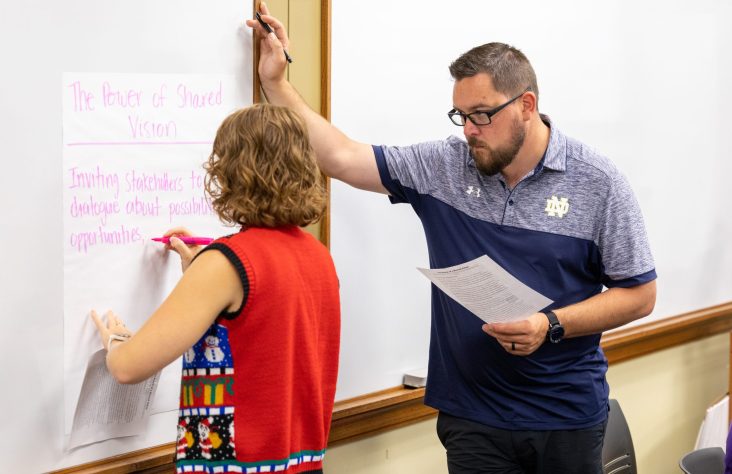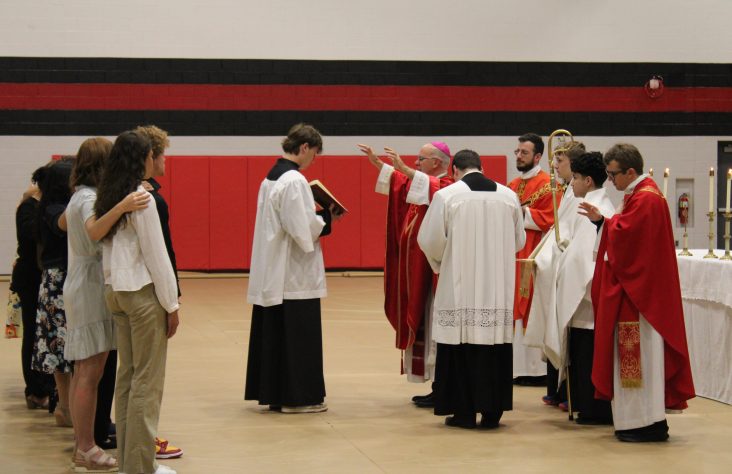March 17, 2015 // Uncategorized
The Agony in the Garden
As we approach Holy Week, I invite you to reflect on the sorrowful mystery of Jesus’ agony in the garden of Gethsemane. In the second reading this Sunday, the Fifth Sunday of Lent, we read: In the days when Christ was in the flesh, he offered prayers and supplications with loud cries and tears to the one who was able to save him from death, and he was heard because of his reverence. Son though he was, he learned obedience from what he suffered; and when he was made perfect, he became the source of eternal salvation for all who obey him (Hebrews 5:7-9). This passage recalls the agony of Jesus in Gethsemane.
Often in our devotion to the passion of Christ, we consider the physical aspect of Jesus’ suffering. We meditate on His scourging at the pillar and His crowning with thorns. We think about the physical pain He suffered carrying the cross, the pain He felt being stripped of His garments, the excruciating pain of being nailed to the cross. These sufferings remind us of the horrible physical torment Jesus underwent for love of us. Reflecting on these aspects of the passion moves our hearts, helps us to appreciate the depth of God’s love for us. They also provide us with a feeling of Christ’s union with us when we experience physical pain and illness. But I’d like to reflect with you on the interior or spiritual aspect of Jesus’ passion which had its culminating moment in Jesus’ agony in Gethsemane.
This important episode in the mystery of Christ’s passion is described in all four Gospels as well as the mention in this Sunday’s reading from the letter to the Hebrews. I believe that, together with Jesus hanging on the cross, the mystery of the agony in the garden is the most profound mystery to contemplate in the whole story of the passion, in the event of our redemption. There in the garden, Jesus Himself expressed in words the intensity of His agony: my soul is sorrowful even to death. Or another translation: My soul is ready to die with sorrow. The evangelists tell us that Jesus was greatly distressed and troubled. This was Jesus’ spiritual agony, something even more painful than His physical agony.
What was happening in Gethsemane? What was the torment going on inside Jesus? Some of the great mystic saints describe a similar experience, what Saint John of the Cross called the “dark night of the soul.” Our soul can be filled with great sorrow, fear, even desperation when God allows us to see clearly our own sinfulness. But Jesus was without sin. Yet, he experienced the terrible horror of sin since He was about to carry all the sins of mankind. He had not committed them, but He bore them. In the first letter of Peter, we read: He Himself bore our sins in His body. Saint Paul wrote to the Corinthians that for our sake, God made Him to be sin who knew no sin, so that in Him we might become the righteousness of God. Saint Paul wrote to the Galatians that Christ became a curse for us. Jesus is the suffering servant foretold by Isaiah who bears the sins of the world. Isaiah wrote: It was our infirmities that he bore, our sufferings that he endured … he was pierced for our offenses, crushed for our sins. Upon him was the chastisement that makes us whole.
The Gethsemane experience was Jesus’ anticipation of bearing the guilt of all the sins of human history as if it were His own. I imagine that Jesus in His human nature experienced the natural fear of his impending suffering and death, but I think His agony in the garden was something more painful. It was the burden of the mystery of the world’s sin which lay on His heart. He was about to carry the awful burden of the world’s sin. This suffering of Jesus was the greatest suffering ever endured in the history of the human race. In Gethsemane, every sin in human history, past and future, were present in mystery: from the sin of Adam and Eve, the sin of Cain, the sins of infidelity of the chosen people, the sins of the people of the new Israel as well, the sins of us all. Our Lord carried all this iniquity as if it were His own.
Jesus’ torment was caused also by the experience of abandonment, not only by his friends, but by His heavenly Father. God has an infinite hatred of sin, so the nearness of sin naturally brought also the experience of the distance of God. In the garden, Jesus experienced in His human nature this abandonment. Again, perhaps we find this experience among human beings most dramatic in the descriptions of the mystic saints and the dark night of the soul. Yet, we all can experience this distance of God at different times in our lives and we know how troubling it is. It is a feeling of desolation and abandonment. But Jesus’ experience of this was something infinitely more painful. Perhaps it is best captured in our Lord’s cry from the cross: My God, my God, why have you abandoned me? or Why have you forsaken me? Not only had Jesus experienced the abandonment of His human companions, the apostles, but even more difficult, separation from His Father. Isn’t this the principal effect of sin? Jesus took upon Himself the principal effect of sin which was abandonment. Jesus’ cry was one of abandonment, but not despair. The soul that despairs never cries to God.
In the midst of His agony in the garden, Jesus prayed. He said: My Father, if it be possible, let this cup pass from me. … This prayer of our Lord reveals the depth of His torment and anguish. When we face suffering, we also pray that God will take it away. But even more importantly, after making that prayer, Jesus adds: yet not what I will, but what you will. The Gethsemane experience reached its climax and resolution in those words of Jesus. This is Jesus’ fiat. We often reflect on Mary’s fiat at the Annunciation: I am the handmaid of the Lord. Let is be done to me according to your word. This is Jesus’ fiat in the midst of agony. This is Jesus’ act of obedience to the will of His Father. As Mary consented to the incarnation, Jesus utters the fiat of the redemption. The divine Son freely consented with His human will. The salvation of us all really rests on this fiat of Jesus.
The letter to the Hebrews says that Jesus learned obedience from what He suffered. In Gethsemane, Jesus obeyed His Father’s will. He said yes to the passion, to dying for the sins of the human race, to drinking the cup of suffering and death. He said yes to fulfilling in Himself the destiny of the Suffering Servant of God foretold by Isaiah. In the darkness of the agony, He said yes to God even when His Father seemed so far from Him. And this is what has brought about our redemption. Saint Paul wrote to the Romans: For as by one man’s disobedience many were made sinners, so by one man’s obedience, many will be made righteous. Of course, this all came to pass on Good Friday, when the sacrifice of Jesus was consummated on the cross. But on Holy Thursday, He accepted in His human will that the Father’s will be done. He freely embraced in His human heart the Father’s love for us. Out of love for His Father and for all people, whom the Father wants to save, Jesus freely accepted His passion and death.
The Gethsemane experience did not end in defeat but in victory. Jesus’ soul descended into the abyss. He descended into hell for us but He never lost His filial trust in God, whom He continued to call Abba, my Father, Papa. His absolute obedience destroyed sin and its power. The letter to the Hebrews tells us that He was truly heard because of His reverence, that is to say, because of His obedience. This obedience has brought blessings to the whole human race. Through his obedience, all are made righteous, Saint Paul says.
We are called to imitate the fiat of Jesus in the garden, His obedience to the Father. When we find this difficult, as it often can be, we can fall on our knees beside Jesus in Gethsemane and He will teach us how to obey. Obedience to God should be the daily fabric of our lives as Christians. We must seek to obey the Lord and we do so every time we say no to sin and yes to grace. There is no activity in our lives that cannot be transformed into an act of loving obedience to the Father. Jesus obeyed God His Father in the midst of the most terrible darkness of the soul. And, as Hebrews tells us, His prayer was heard because of His reverence.
Jesus is our model for doing God’s will and nowhere is this seen more dramatically than in His experience of the passion, especially his agony in the garden, and his prayer in the midst of that agony: nevertheless, not my will, but yours, be done. His complete trust and his obedience, even in the terrible experience of abandonment, is the model for us.
At different times in our life, we may find it easy to pray with Jesus: Father, if it is possible, let this cup pass from me. It is much more difficult to pray from our hearts the second half of His prayer: nevertheless, not my will, but yours, be done. But with the Lord’s grace, we can pray those words. With His grace, we can be obedient. With His grace, we can share in the mystery of His redemptive suffering. With His grace, we can be partners in the paschal mystery. With His grace, we can follow in His footsteps from Gethsemane to Calvary, knowing that Calvary is not the end, rather the empty tomb is, glorification in heaven is. We see this in Mary, the Mother of Sorrows, who because of her sinlessness and her complete union with her Son in His redemptive suffering, was assumed body and soul into heaven. Like Mary, our true joy is found in sharing in the destiny of Jesus. The Gethsemane experience ends not in defeat but in victory.
The best news. Delivered to your inbox.
Subscribe to our mailing list today.





